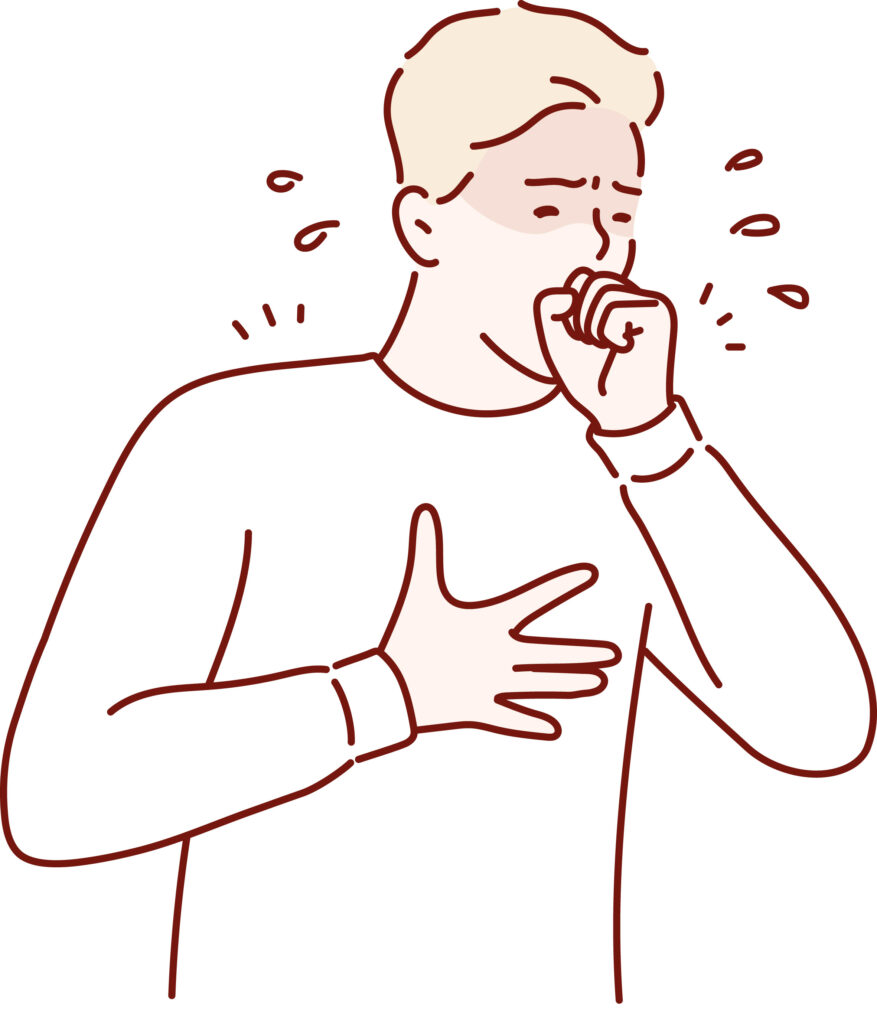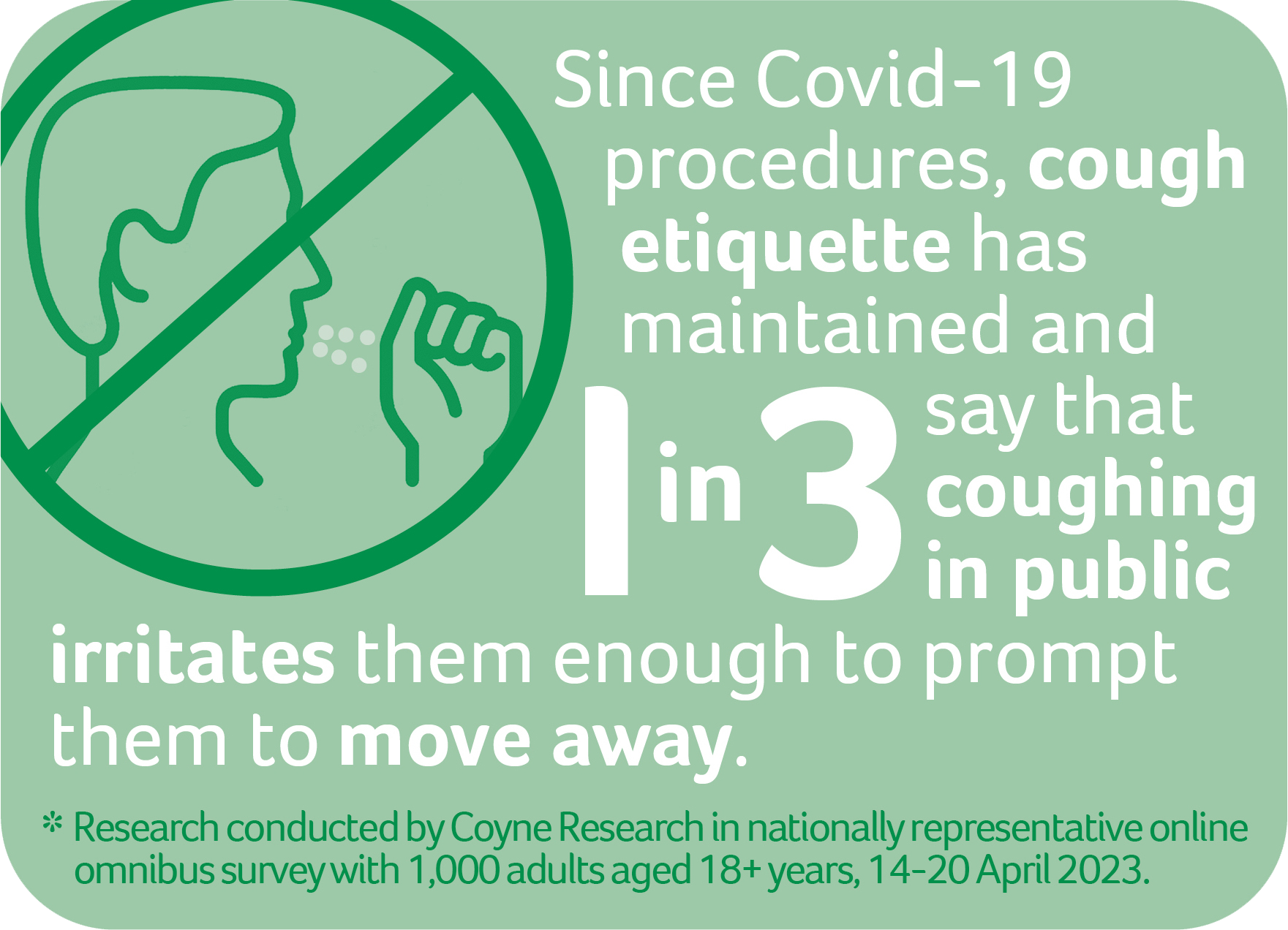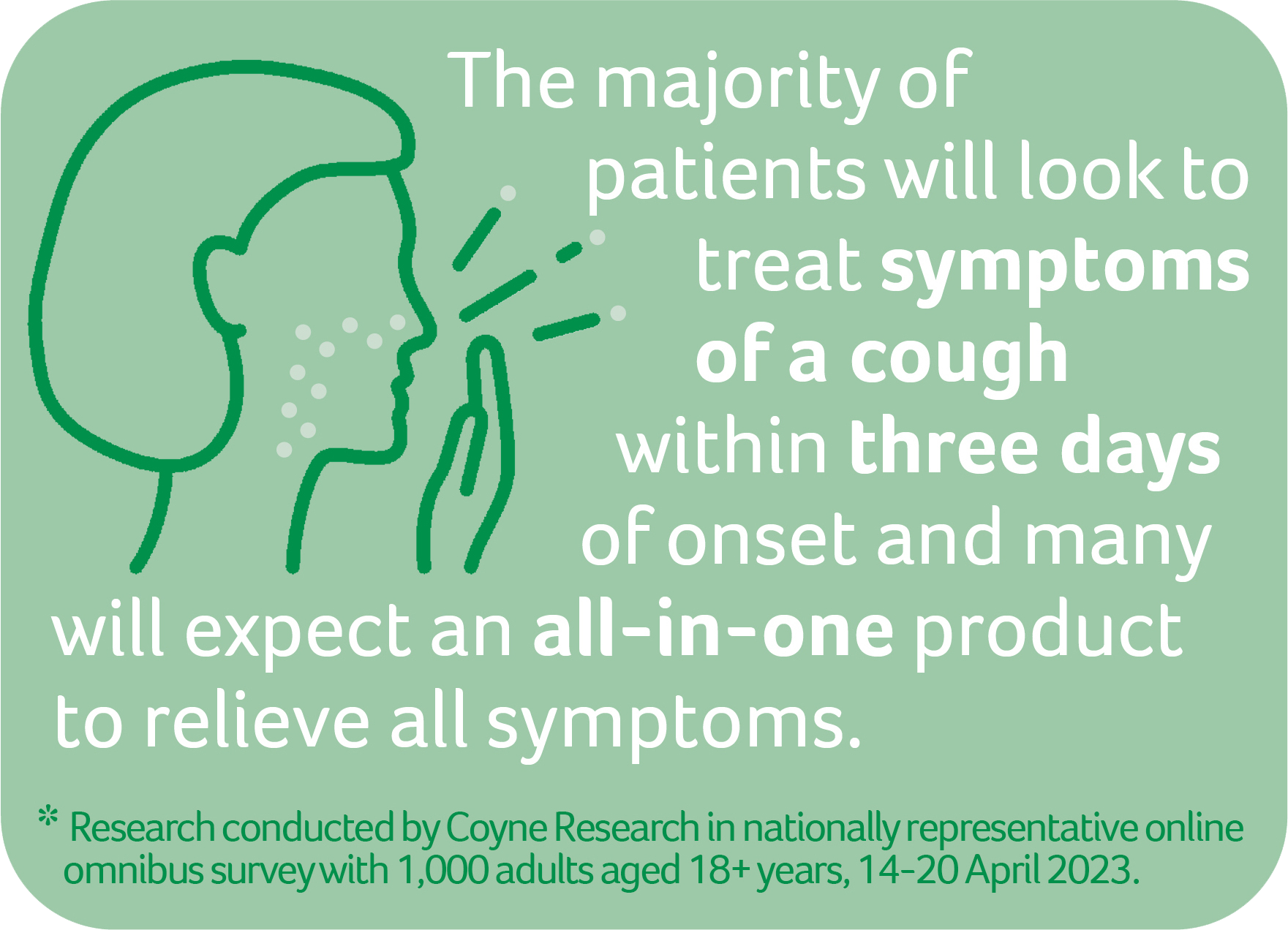Home » Cough: consultation and treatment options

With the autumn months setting in, more people are presenting in pharmacies for advice and treatment of coughs. Coughs can be categorised as acute (duration of less than three weeks); subacute (duration of three to eight weeks); or chronic (duration of greater than eight weeks). Since COVID-19 procedures, cough etiquette has maintained and one in three adults say that coughing in public irritates them enough to prompt them to move away. A cough is one of the most common medical complaints, and is the most common symptom for which people seek advice at their community pharmacy. They are usually self-limiting, however, in some cases coughs can indicate serious underlying disease. Through consultation with trained pharmacy teams, red flags and danger symptoms can be identified and referred to the pharmacist or GP if necessary. It’s important for the whole pharmacy team to engage with customers and ensure the best treatment outcomes. Through our pharmacy consultations, the most appropriate advice and treatments are recommended, with patients getting the best possible care.
“Through consultation with trained pharmacy teams, red flags and danger symptoms can be identified and referred to the pharmacist or GP if necessary.
The majority of patients will look to treat symptoms of a cough within three days of onset, and many will expect an all-in-one product to relieve all symptoms. When people are unwell they want professional advice to help them feel better quickly. Every interaction with a patient is an opportunity to provide the most appropriate advice and treatment recommendations.
Pharmacy teams can use their own consultation questions and SOPs to gather the relevant information from the patient presenting. For example:
Ensuring you give the patient time to listen to their symptoms will encourage them to discuss their healthcare needs with you. Recommending the appropriate treatment and advice will be appreciated by the patient and they will trust you to come back in the future.
The most common causes of acute cough in adults are acute viral upper respiratory infections — a cold or flu and acute bronchitis. Other causes of cough in adults are caused by upper airway cough syndrome (UACS, also known as postnasal drip syndrome), asthma, or gastroesophageal reflux disease (GERD), alone or in combination. Other factors can include smoking, allergies such as hay fever and medication treatment with ACE inhibitors.
Identify if the cough is dry — in the throat or chesty — in the chest. A chesty cough usually brings up phlegm or mucous. Dry coughs which are non-productive are often caused by different ailments such as hay fever, asthma and acid reflux.
Pharmacy teams can refer to the pharmacist if any of the following red flags are present for adults or children presenting with cough. Following consultation with the pharmacist, a GP referral may be necessary.
Red flags for adults include:
Refer to a GP for children in the following instances:

 <
<
Treatment isn’t always necessary for short-term coughs as it’s likely to be a viral infection that will get better on its own within a few weeks. As per HSE guidance, symptoms of acute cough in adults can be alleviated by using self-care treatments. Advise the patient that acute cough may persist for up to three to four weeks and the importance of rest and hydration. For symptom relief, honey is recommended first (for example, hot water with honey and lemon), and can be used as soothing effect. Paracetamol and (if appropriate) ibuprofen, are recommended for associated pain. For other treatments, the choice of product should be based on patient preference, presenting symptoms, and clinical considerations, such as contraindications and potential drug–drug interaction.
Codeine based products are not recommended as antitussives as they have no proven efficacy and pose the risk of adverse effects. Codeine products have the potential to be misused and also come with a range of side effects including dependence, drowsiness, nausea and constipation.
Dextromethorphan is the most common suppressant for dry coughs. It is very well tolerated and has a wide therapeutic window. Caution is advised however, as it cannot be taken along with selective serotonin reuptake inhibitors (SSRIs) and monamine oxidase inhibitors (MAOIs) due to a risk of serotonin syndrome. Patients presenting with a non-productive cough who are known to have asthma should not be given cough suppressants as these may contribute to respiratory depression or mask signs and symptoms of asthma flare-ups.
Expectorants such as guaifenesin-containing products and mucolytics such as carbocisteine can be used to treat chesty coughs. They work by increasing the volume of sputum and decreasing its viscosity, helping it to be cleared easier from the airways.
Antihistamines play a role in cough treatment. Diphenhydramine can help reduce symptoms associated with the common cold and UACS. Diphenhydramine is a sedative and has anticholinergic effect such as blurred vision and dry mouth. Cetirizine, loratadine and fexofenadine can also play a role in treating cough associated with UACS.
Acute cough in children is mainly caused by a self-limiting viral upper respiratory tract infection and resolves without antibiotics within three to four weeks. The other most common causes of cough in children include asthma, respiratory tract infections, and GERD. Associated symptoms can include sneezing and fever in a clinically well child. Antibiotics do not generally improve the overall clinical condition.
For symptom relief, honey can be used in children over one year of age for a soothing effect, if there are no dental concerns (for example, hot water with honey and lemon). Paracetamol and ibuprofen are recommended for associated pain. There are specific children’s cough medicines of the adult versions available, however only for children aged over six years and only on pharmacist or GP advice. There is no evidence to suggest a role for these cough remedies, decongestants or antihistamines as treatment options.
Complementary and alternative medicines such as marshmallow, eucalyptus, liquorice and thyme can play a role in symptom management for coughs in both children and adults. They can be recommended for all types of coughs, chesty or dry and are suitable from one years of age. Although people may feel they get symptomatic relief with these products there is no evidence to demonstrate their efficacy in the management of cough. As with all complimentary and herbal medicines it is important to discuss medication history during the consultation as there are possible interactions and contraindications.
Antibiotics are not recommended to treat an acute cough associated with an upper respiratory tract infection or acute bronchitis in adults who are not systemically very unwell, or at higher risk of complications. Antibiotics do not improve the overall clinical condition and make little difference to duration of symptoms. On average, they shorten cough duration by about half a day. Antibiotic use also comes with possible adverse effects, particularly diarrhoea and nausea.
People with an acute cough may be at higher risk of complications if they:
Antimicrobial resistance is a significant threat to public health, and widely acknowledged to be associated with the excessive and inappropriate consumption of antibiotics. Most antibiotics are prescribed in primary care settings and frequently to treat respiratory tract infections, which account for approximately one quarter of primary care attendances. C-reactive protein point-of-care testing (CRP POCT) can play a role to assist in ruling out serious bacterial infection, and so supporting a decision not to prescribe an antibiotic to those who are unlikely to benefit from treatment.
There are many non-pharmacological treatment options available for cough. Patients should be advised to rest, drink plenty of fluids and ensure they get enough sleep. Steam inhalation and drinking warm fluids can help to loosen mucous, while lifestyle changes such as smoking cessation, weight loss and reducing alcohol intake can also prove beneficial to treating underlying causes of cough.
To avoid passing on coughs to others, good cough and hand hygiene steps should be followed.
References available on request.

Highlighted Articles